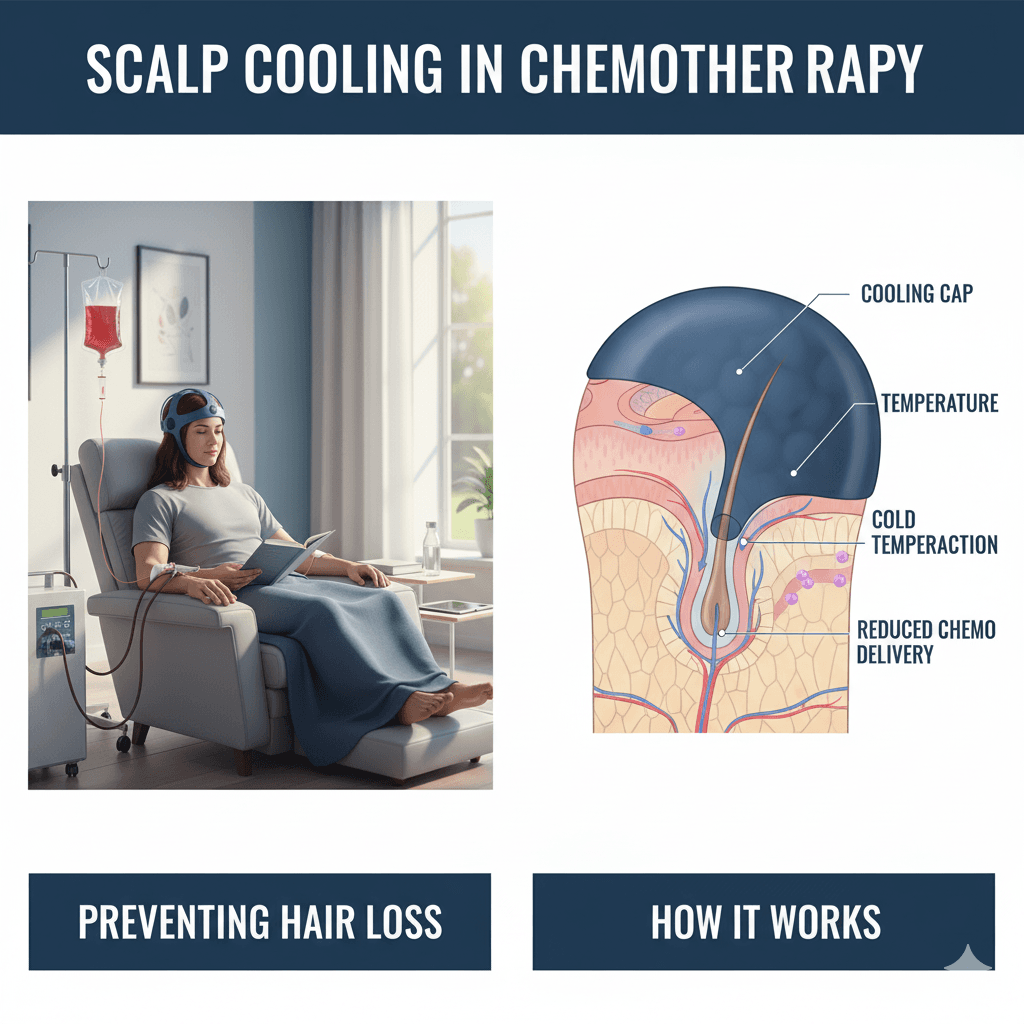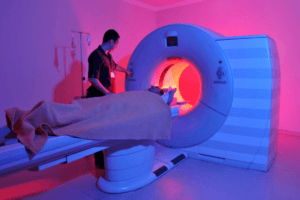
Scalp Cooling in Chemotherapy

Q1: What is Scalp Cooling in chemotherapy treatment?
Scalp cooling, also known as cold cap therapy, is a technique used during chemotherapy to help reduce hair loss, a common side effect of cancer treatment. The method involves wearing a cooling cap on the scalp before, during, and after chemotherapy sessions. The cold temperature constricts the blood vessels in the scalp, reducing the amount of chemotherapy drugs that reach the hair follicles and helping to minimize hair loss.
Q2: How does Scalp Cooling work?
Scalp cooling works by lowering the temperature of the scalp, which reduces blood flow to the area. This constriction of blood vessels means that fewer chemotherapy drugs reach the hair follicles, thereby protecting them from the damaging effects of the treatment. The cooling effect also slows down the metabolism of the hair follicles, making them less susceptible to the chemotherapy drugs. As a result, patients may experience less hair loss or retain more of their hair during treatment.
Q3: What types of cancer treatments can benefit from Scalp Cooling?
Scalp cooling is most commonly used during chemotherapy treatments for solid tumors, such as:
- Breast cancer
- Ovarian cancer
- Prostate cancer
- Lung cancer
It is generally used for chemotherapy regimens that are known to cause hair loss (alopecia). However, scalp cooling may not be effective or recommended for all types of chemotherapy or cancers, so it’s important to discuss with your oncologist whether this option is suitable for your treatment.
Q4: What are the benefits of Scalp Cooling?
The benefits of scalp cooling include:
- Reduced hair loss: The primary benefit is the potential to retain more hair during chemotherapy, which can help maintain your appearance and self-esteem.
- Emotional support: For many patients, keeping their hair can help them feel more in control during a challenging time and reduce the emotional impact of cancer treatment.
- Improved quality of life: By reducing hair loss, scalp cooling can make it easier to maintain daily routines and social activities, improving overall quality of life during treatment.
Q5: What should I expect during a Scalp Cooling session?
During a scalp cooling session:
- Preparation: You will wear a specially designed cooling cap that fits snugly over your scalp. The cap is connected to a cooling machine that circulates cold fluid through the cap to maintain a consistent temperature.
- Timing: The cooling process usually begins 30 minutes before chemotherapy starts, continues throughout the chemotherapy session, and typically lasts for 60-90 minutes afterward.
- Comfort: Some patients initially feel cold or experience headaches during the treatment, but these sensations usually subside as the scalp becomes numb.
Q6: Are there any side effects or risks associated with Scalp Cooling?
Scalp cooling is generally safe, but there are some potential side effects, including:
- Cold-related discomfort: You may feel cold, particularly on the scalp, or experience headaches during the treatment.
- Scalp tenderness: Some patients report scalp tenderness or discomfort after the cooling session.
- Uneven hair loss: In some cases, hair loss may still occur, but it might be patchy or uneven.
Scalp cooling is not recommended for everyone, especially if there are concerns about cancer cells being present in the scalp, as reducing blood flow to the area could theoretically reduce the effectiveness of chemotherapy in that region.
Q7: How effective is Scalp Cooling?
The effectiveness of scalp cooling varies depending on factors such as the type of chemotherapy, the dose, and individual patient characteristics. Some patients may experience significant hair retention, while others may still experience some hair loss. On average, scalp cooling is effective in preventing hair loss in about 50-70% of patients who use it.
Q8: How do I know if Scalp Cooling is right for me?
Whether scalp cooling is suitable for you depends on the type of chemotherapy you are receiving, your personal preferences, and any medical considerations. If preserving your hair during treatment is important to you, discuss the option of scalp cooling with your oncologist. They can provide guidance on whether this approach is appropriate for your specific treatment plan.
If you have more questions about scalp cooling or are considering it as part of your chemotherapy treatment, talk to your healthcare provider. They can provide detailed information and help you decide if scalp cooling is the right option for you.
Related Post


CyberKnife
August 6, 2024

Immunotherapy
August 7, 2024

MRI Linac
August 7, 2024

Gamma Knife
August 7, 2024

Cancer Screening
August 22, 2024
Gallery
Click below to book a clinic appointment
Ask More Questions Send Query On Email





